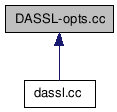| | DEFUN_DLD (dassl_options, args,,"-*- texinfo -*-\n\
@deftypefn {Loadable Function} {} dassl_options (@var{opt}, @var{val})\n\
When called with two arguments, this function\n\
allows you set options parameters for the function @code{dassl}.\n\
Given one argument, @code{dassl_options} returns the value of the\n\
corresponding option. If no arguments are supplied, the names of all\n\
the available options and their current values are displayed.\n\
\n\
Options include\n\
\n\
@table @code\n\
@item \"absolute tolerance\"\n\
Absolute tolerance. May be either vector or scalar. If a vector, it\n\
must match the dimension of the state vector, and the relative\n\
tolerance must also be a vector of the same length.\n\
@item \"relative tolerance\"\n\
Relative tolerance. May be either vector or scalar. If a vector, it\n\
must match the dimension of the state vector, and the absolute\n\
tolerance must also be a vector of the same length.\n\
\n\
The local error test applied at each integration step is\n\
\n\
@example\n\
@group\n\
abs (local error in x(i))\n\
<= rtol(i) * abs (Y(i)) + atol(i)\n\
@end group\n\
@end example\n\
@item \"compute consistent initial condition\"\n\
If nonzero, @code{dassl} will attempt to compute a consistent set of initial\n\
conditions. This is generally not reliable, so it is best to provide\n\
a consistent set and leave this option set to zero.\n\
@item \"enforce nonnegativity constraints\"\n\
If you know that the solutions to your equations will always be\n\
nonnegative, it may help to set this parameter to a nonzero\n\
value. However, it is probably best to try leaving this option set to\n\
zero first, and only setting it to a nonzero value if that doesn't\n\
work very well.\n\
@item \"initial step size\"\n\
Differential-algebraic problems may occasionally suffer from severe\n\
scaling difficulties on the first step. If you know a great deal\n\
about the scaling of your problem, you can help to alleviate this\n\
problem by specifying an initial stepsize.\n\
@item \"maximum order\"\n\
Restrict the maximum order of the solution method. This option must\n\
be between 1 and 5, inclusive.\n\
@item \"maximum step size\"\n\
Setting the maximum stepsize will avoid passing over very large\n\
regions (default is not specified).\n\
@item \"step limit\"\n\
Maximum number of integration steps to attempt on a single call to the\n\
underlying Fortran code.\n\
@end table\n\
@end deftypefn") |


